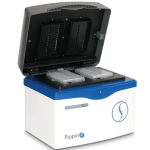Assembly and annotation of a draft genome sequence for Glycine latifolia, a perennial wild relative of soybean
April 2018
Authors:
Qiong Liu, Sungyul Chang, Glen Hartman, and Leslie Domier
Info:
At the University of Illinois, scientists sequenced a wild perennial relative of the soybean plant, producing a 939 Mb draft assembly using linked reads from a single library on the 10x Genomics Chromium system. PippinHT was used to target the longest DNA fragments for analysis.
Citation:
The Plant Journal
doi: 10.1111/tpj.13931
Intact DNA purified from flow-sorted nuclei unlocks the potential of next-generation genome mapping and assembly in Solanum species
April 2018
Authors:
Paola Gaiero, Hana Šimková, JanVrána, Federico Santiñaque, et al.
Info:
Scientists from Wageningen University & Research and other institutions embarked on a project to improve sample prep protocols for obtaining high molecular weight DNA from plant cells for optical mapping workflows. They cite BluePippin for use in a pulsed field gel electrophoresis step and use Pippin Pulse as well.
Citation:
MethodsX
Volume 5, 2018, Pages 328-336
A Validation Approach of an End-to-End Whole Genome Sequencing Workflow for Source Tracking of Listeria monocytogenes and Salmonella enterica
March 2018
Authors:
Anne-Catherine Portmann, Coralie Fournier, Johan Gimonet, Catherine Ngom-Bru, et al.
Info:
Scientists from Nestle Research Center and Nestle Institute of Health Sciences aimed to establish guidelines for whole-genome sequencing used in contamination investigations in the food industry. The team used BluePippin for size selection prior to sequencing with PacBio.
Citation:
Front. Microbiol., 14 March 2018
doi: 10.3389/fmicb.2018.00446
Full-length mRNA sequencing uncovers a widespread coupling between transcription initiation and mRNA processing
March 2018
Authors:
Seyed Yahya Anvar, Guy Allard, Elizabeth Tseng, Gloria Sheynkman, et al.
Info:
Researchers from Leiden University Medical Center and other institutions studied the relationships between transcription initiation and splicing and polyadenylation events in breast cancer cells and several types of human tissue. They found that there are still unresolved mechanisms governing transcription. The team used SageELF to create size-based fractions for cDNA libraries prior to sequencing with PacBio.
Citation:
Genome Biology 2018 19:46
doi: 10.1186/s13059-018-1418-0
Transmission of microRNA antimiRs to mouse offspring via the maternal-placental-fetal unit
March 2018
Authors:
Jonas Hönig, Ivana Mižíková, Claudio Nardiello, David Emanuel Surate Solaligue, et al.
Info:
In Germany, researchers delivered microRNA inhibitors to pregnant mice, finding that the antimiRs were then detectable in offspring, where they caused fewer off-target effects compared to direct injection of antimiRs into mouse pups. This approach could make it easier to study the effects of microRNAs during pregnancy and early postnatal development. For this project, the team used PippinHT to size-select RNA pools with a target size of 154 bp.
Citation:
RNA
http://rnajournal.cshlp.org/content/early/2018/03/14/rna.063206.117.abstract





